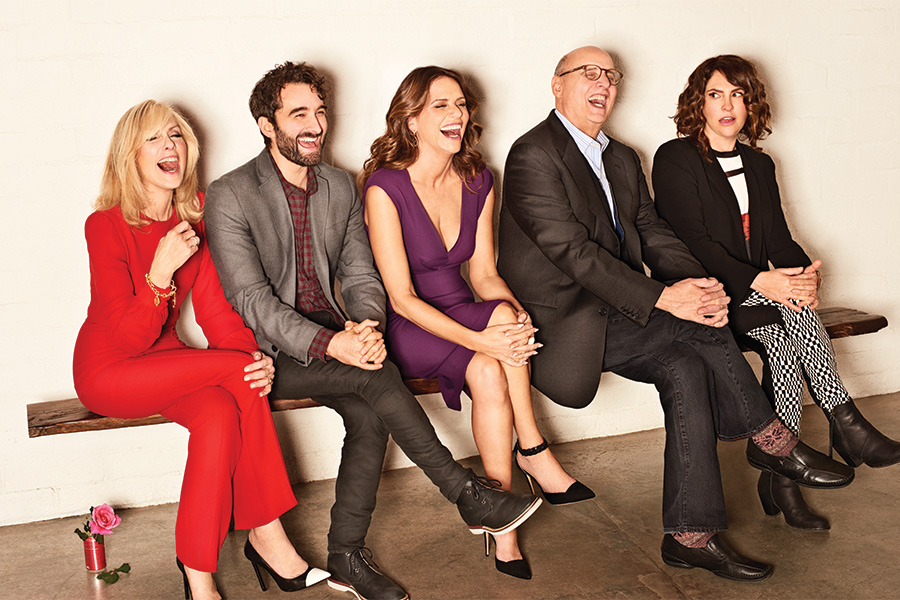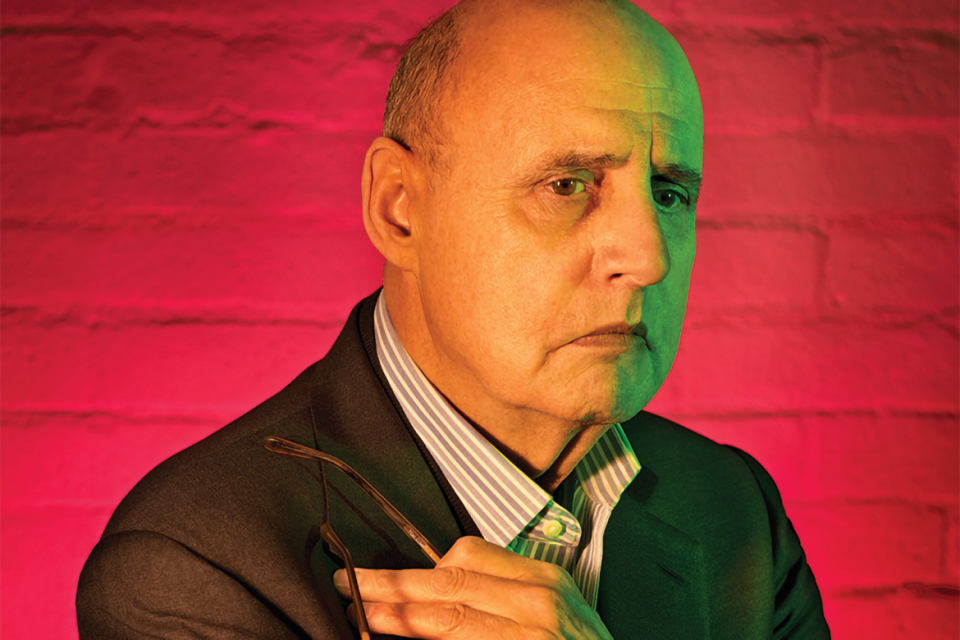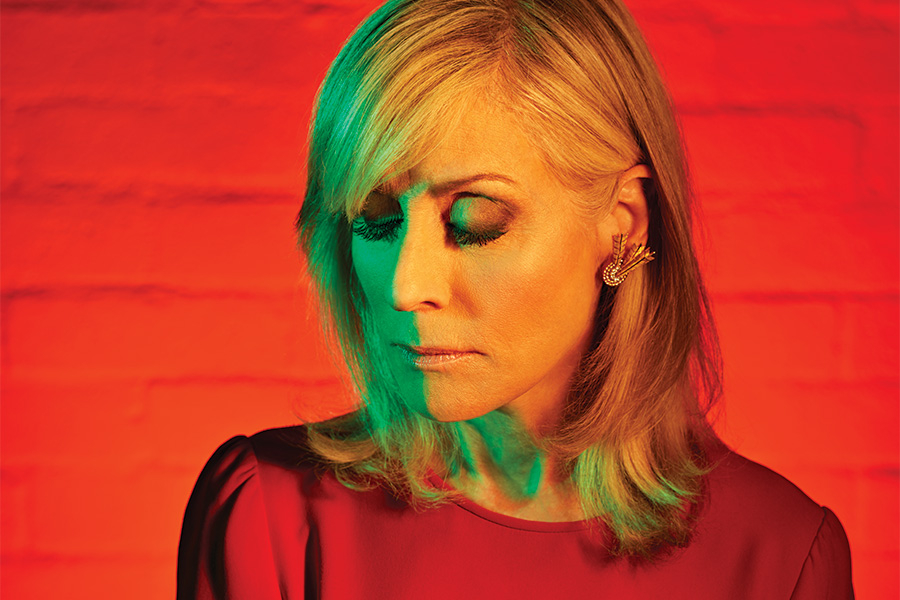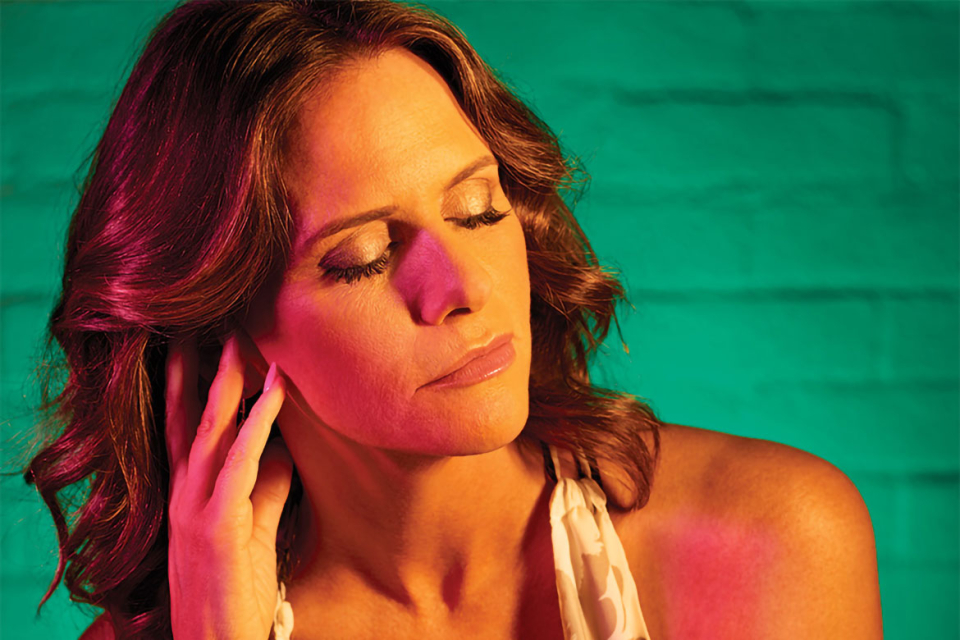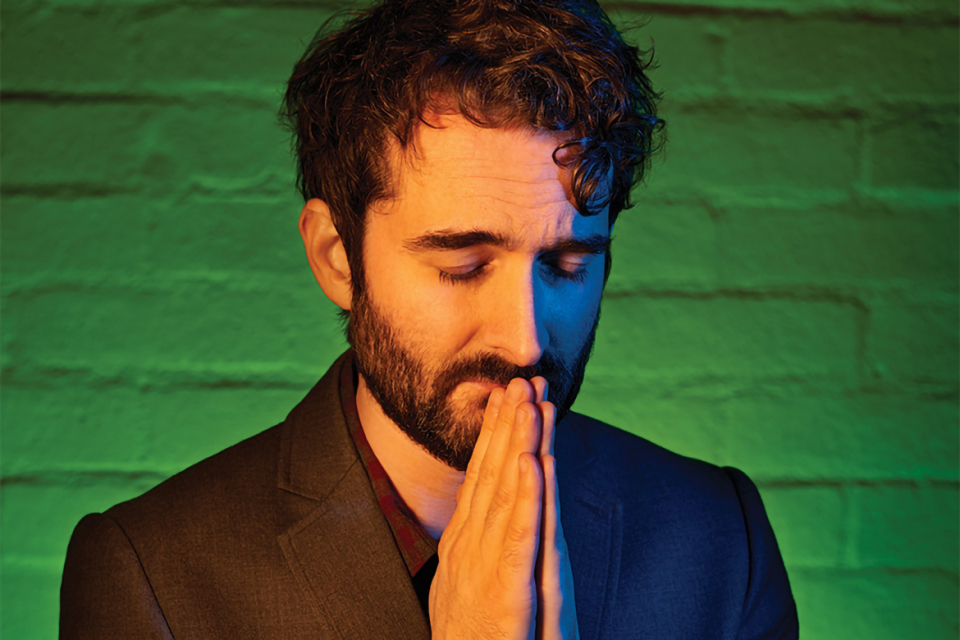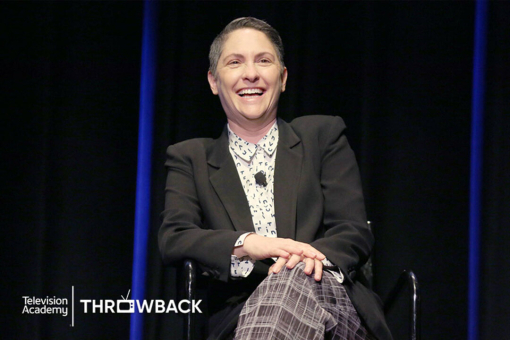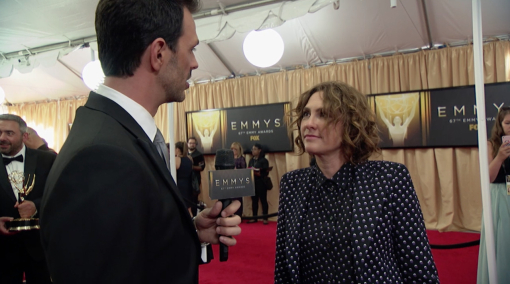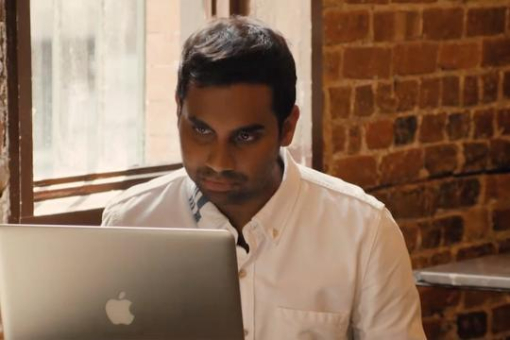Two of the leads on Transparent are sitting at a cafe in Santa Monica, California, wondering if people even know how to find their show, which streams exclusively on Amazon Instant Video.
"I still get this all the time from people — 'How do I find it? What do I do? What are the actual steps?" says Jeffrey Tambor, who plays the patriarch of the Pfeffermans, a westside L.A. Jewish family. In his luminous performance, he presents alternately as Mort and Maura during the course of telling his three adult children of his late-in-life decision to transition from male to female.
"Amazon needs an icon that people can find when they want to watch it on their TV," says Amy Landecker, who plays Sarah, his eldest. Despite such challenges, Transparent has been critically acclaimed since its full-season premiere last year. It's also been a bellwether for growing societal acceptance of transgender people and their journeys.
When the show won the Golden Globe for best TV series, musical or comedy and Tambor won best actor in a TV series, musical or comedy, it was all the more remarkable that a first-season streaming show from Amazon — a provider better known for its dominance in online retail — had prevailed over shows from HBO, Showtime and Netflix (yes, another streaming service). In the entertainment world, that was yet another example of head-spinning disruption.
"We went from pilot to pick-up to release to the Golden Globes within pretty much a 12-month period," Landecker marvels. "That's insane."
"That's how the world is changing," Tambor says. "In a couple of years, what platform you're being shown on will not even be a discussion."
"Television started out as a way to sell soap," Landecker muses. "And here we are selling shipping. You pay 99 bucks to get Amazon Prime, and you can watch the shows and get free two-day shipping for a year. It's a good deal."
"It is a good deal," Tambor agrees,
Shortly after the Globes win, Amazon moved to raise the show's profile by streaming all 10 episodes free of charge in one 24-hour period.
Not everyone who watches Transparent falls under its spell. Online, detractors have called it "odd" or "weird" and said its characters are unlikeable. They gripe that the sexual adventures of the younger set (Maura has so far been exempt) are depicted far too blatantly and frequently, and are messy and confusing. If any taboos were still hanging around, this series has trampled them.
But for the many who love the show, it richly transcends these complaints. What seems miraculous, while watching it, is the sense of experiencing a story both familiar and entirely new, a bold and absorbing emotional tapestry woven from previously undiscovered materials. Transparent is an intimate family saga told with disarming bravery — something far easier to aspire to than to achieve.
The essence of the show — created by Jill Soloway and executive-produced by Soloway and Andrea Sperling — is that "by Maura telling her truth about who she is, and having the courage to claim the life she wants to live, it forces everyone else to be authentic," says Judith Light. The Broadway and TV veteran plays Shelly Pfefferman, Mort's ex-wife and the children's mother.
"Maura is 70, and she's making a break for her freedom," Tambor says. "I don't think she's a saint, but she's the first one [in the family] to make the move. And then everybody follows."
This thunderbolt hits Sarah (Landecker) just as she's rekindled a hot affair with a female lover (Melora Hardin) from her college days. It puts her on the verge of abandoning her husband, Len (Rob Huebel), and her suburban-mom lifestyle.
Middle child Josh (Jay Duplass) is a pop-music producer who chafes at authority and indulges an insatiable need to bed women. The youngest, Ali (Gaby Hoffman), is a bright but unemployed sponger whose misadventures in quest of identity are perhaps the most searching and gender-fluid of all.
“To call it Amazon's first great series, or the only great series of the new fall season — both of which are true — is to damn it with faint praise," raved critic Willa J Paskin in her Slate review last year. The title, she pointed out, is more than a pun about a transgender parent. This is a show "about transparency and secrecy, about... what we can't help but reveal even as we try to keep it hidden."
Jill Soloway wrote the show from a deeply personal place. Her own father had announced himself as transgender some three years ago.
An accomplished television writer (Six Feet Under, United States of Tara, Grey's Anatomy), Soloway says she sensed immediately that the revelation of this family secret, and all its implications, would become, for her, a very significant creative arena. And yet she started writing without seeking permission from her parent,
"You have to understand," she explains, "I've been writing between one and three pilots a year for 10 years, and none of them were ever made. I sold them, but nobody ordered a pilot. It used to be that when I wrote something based on somebody I knew, I'd have that conversation to get permission — and then it ultimately never mattered. So I stopped doing that. It was almost as if I was daring the universe to make it happen."
And then it did.
To be sure, making television this timely and inspired required a remarkable confluence of events.
Soloway had written and directed a feature film, Afternoon Delight, which won the directing prize at the Sundance Film Festival when it premiered there in 2013. A sharply observed comedy about a well-meaning west-side yoga mom (Kathryn Hahn) who puts her marriage at risk when she takes a homeless sex worker under her wing, the film displayed a deftness of tone that impressed Amazon head of comedy Joe Lewis.
"It's so hard to execute something that's both funny and sad," he points out. "I called her agent and said, 'I'd like to meet with this person.' He got back to me and said, 'You're in luck — she has a new project she wants to talk about.'"
When Lewis read the pilot script for Transparent, he says, "I flipped for it."
He did ask for one fundamental change. Originally, Soloway had Mort break the news of his transition to his grown children within the first eight pages, Lewis wanted to delay the revelation. "I think it made all the difference," he says. "To me, the meat of it was always, 'What's going to happen when the family finds out?' And that's more meaningful when you've had a little while to get to know them as characters."
Soloway was on board with that.
"And," Lewis says, "she promised to guarantee the tone. That's the point at which we said, 'We want to do this show with you.' And Jill is one of the best creative partners I've ever had. This show is her vision — every frame of it — and yet it feels like a collaborative effort."
For Soloway, a deal with Amazon appealed partly because the independent film world has become so inhospitable to smaller movies.
"It's so hard to find investors and get a distribution deal, and then get people to show up to see it," she laments. "Steven Soderbergh gave an address a few years ago about how the movie business now can only support films that make sense internationally. I don't know how to write that big-budget movie.
"What I recognized when Amazon made this offer was that I was being given money to make essentially a five-hour film with international distribution already in place. Yes, they're cutting it up into 10 episodes, but that's fine, because the people have the option to watch it all at once. The binge is actually an exciting distribution model."
It's no accident, then, that cable and streaming shows are newly awash with talents born on the independent film circuit. Equally important, Amazon was offering a production budget and salaries competitive with premium-cable standards, and that most prized of all working conditions: creative autonomy.
"Amazon has a model where they give creators a lot of freedom," Soloway says, "and I was at a place in my career where I knew what to do with that freedom. I had credibility as a director, and I had a team in place I wanted to work with. It could not have been more perfect."
Her first and most essential task was casting. "It was always going to be Jeffrey Tambor," she says of the lead. "Jeffrey reminds me so much of my parent. I had an intuition that he was perfect."
A six-foot-plus character actor with a flair for warped, buffoonish comedy and a mile-long list of credits, Tambor had appeared in cutting-edge projects before.
He was sidekick Hank Kingsley on The Larry Sanders Show, known for his braying catchphrase "Hey, now!" back when HBO was still new at original content. He was George Bluth, Sr., (and his twin, Oscar) on Arrested Development, in both its Fox and Netflix incarnations.
Even so, he says, Maura is "hands-down the most transformative role I've ever played, in the total sense. People say to me, 'Are you in touch with your own femininity?' But it's more than that. It's allowed me to have more compassion and just be more present about everything. I'm more sensitive as a parent. Jill has sort of knocked my head awake."
Tambor remembers the first time he and the show's trio of makeup artists — Emma Johnston Burton, Marie Larkin and Marie Slade — found the look that would become Maura.
"My heart was beating, but I just took it step by step. Suddenly we got the right wig, and I said, 'Oh, hello!' I liked what being Maura did to my face. I like her a lot. And she's young in her journey — she's new at this, just like me. She doesn't know how to put on makeup; she doesn't know how to walk. I'm learning it right along with her."
Maura's look is unfussy and vaguely bohemian — she favors shoulder- length hair and flowing, free-spirited garments. She typically exudes calmness and empathy.
"Maura became a real person through Jeffrey," Soloway says. "The way he allows her soul to come through his body is just astonishing. It's way beyond my greatest imagination."
Next, Soloway cast Light as Mort's ex-wife, Shelly, whose second husband, Ed (Lawrence Pressman), is succumbing to dementia. Shelly is high-strung and brittle; her overtones of Jewish caricature contrast with Maura's calmness.
Light brought the show an added mitzvah — her long history of advocacy on behalf of the gay community began during the AIDS crisis of the 1980s.
"Jill and I are kindred spirits in relation to this issue," Light says. "And now we're in a time when the transgender community is showing the world what we really don't know yet about gender identity and gender fluidity. They're taking us to an advanced level of understanding. So the fact that I get to be a part of this feels like divine choreography."
With two experienced hands anchoring the cast, Soloway could take risks with the younger characters. Still, she says, "There was only one right person for each role." She'd seen both Landecker and Hoffman on Louie, comedian Louis C.K.'s envelope-pushing FX series.
Landecker admits she initially turned down the audition. "It said, 'on-camera sexual nudity required.' I'd had a traumatic experience with that and decided I wasn't doing it anymore."
But in a lunch meeting with Soloway, she was dazzled. "She's brilliant, she's artistic, she's something else." Sexual nudity became a non-issue. "I'd have taken off my clothes right there if she wanted. I was in."
The casting of Jay Duplass (who, with his brother Mark, created and executive-produces the HBO series Togetherness) was pure serendipity.
He and Soloway connected at a dinner party, where she told him about her search for an actor to play Josh. "She said she needed a wildly charismatic, wildly insecure Jewish guy. I went through a list of actors that I love, and she said, 'No, no, this has to be something very specific' Then she stopped and looked at me, and said, 'It's you.' I got chills," he recalls.
Duplass, who forged his career in independent film's low-budget "mumblecore" genre, had next to no acting experience. He, Hoffman and Landecker were asked to test for their roles together.
Once they began to play a scene, "It felt weirdly preordained, like we had been siblings forever," Duplass says, "I realized, 'You can't say no to this.'"
It was the same for Hoffman, who's also known for her work on HBO's Girls.
"Everyone was immediately like family," she says, adding that she has no problem playing a character who's so in flux. "Ali is able to dive whole¬heartedly into each new dead end," she explains, which syncs with the way she herself performs. "I'm not a trained actor at all. I work from instinct. All I'm thinking in the moment is, 'Right now I'm going in this direction, and I'm doing it completely and fully.'"
As for Josh's Casanova ways, Duplass observes, "He has a desperate need to connect. It has to do with knowing that inside you, there's all this potential, and feeling very, very far from actualizing it."
“To be sure, Soloway - who directed seven of the first 10 episodes — gave all the actors remarkable scenes to play.
Maura's journey is "only one-fifth of the show," as Tambor points out. The rest is about everyone else's clumsy progress and wild missteps. Still, asked to name a scene that means a lot to her, Soloway chooses Maura's trip to the mall, where she enters a women's bathroom and is called out as male.
"She gets misgendered," Soloway says. "That's when someone recognizes the gender you're not presenting. They look at her and say, 'That's a man.' That happens so much. Bathrooms are very unsafe places for trans people, and they don't need to be. In most states, it's illegal for trans people to use public bathrooms. Just by entering, they can be sued for 'inflicting distress on others.'" (The city of West Hollywood, California, recently passed legislation designating all single-stall bathrooms as unisex.)
This points to one way in which Soloway hopes Transparent can make a difference.
"There are so many human-rights issues that need to be addressed, and maybe this can help." Her guiding impulse in making the show, she says, is "to make it safe for my parent to walk out of their apartment at night and not feel that they're going to be harassed."
It makes sense, then, that once she knew the pilot was a go, she secured her parent's blessing to tell the story.
"It's been an awesome thing for my family in some ways," she says. "The show itself has become like a big hug, which has helped my parent be okay with the personal nature of it."
Cast members say the most extraordinary aspect for them has been the viewer feedback.
Hoffman, who gave birth around the time the show premiered, has been mostly confined to her Brooklyn neighborhood since then. At her local food co-op, she says, "it's astounding how many people have seen the show and come up to me with tears in their eyes, hugging me and thanking me, and feeling compelled to share all sorts of things. It's been really lovely."
"The show is so of-the-moment and realistic," says Duplass, an L.A. resident who is both happily married and a father. "I've had women call me to say, 'I'm dating your character right now, and your show kind of woke me up to exactly what's going on.' Or guys will say, 'I was Josh from age 26 to 34, and it's tough to watch that.'"
"This show is so heart-centered, so authentic and courageous," Light says. "I really do think that's why it's getting the kind of recognition that it is."
Just a week after Amazon offered that free streaming day, on the January birthday of Martin Luther King, Jr., Soloway reconvened the writers' room to begin work on season two. Production resumes June 26, and 10 new episodes are expected in December.
For everyone involved, there's the satisfaction of knowing they're creating a show that matters beyond its entertainment value.
Amazon's Lewis agrees: "It's hard not to feel like this show has resonated and made a difference," he says. "In my wildest imagination, I never expected I'd be involved with a show that has changed people's lives — maybe even saved people's lives."
Landecker adds: "People say to me, 'What do you want to do next?' — and there is no next. I would love it if this was all I did for the rest of my life. I don't have another dream. I'm living the one I had."
Tambor has reason to believe that a new generation may not find transgender people all that confounding. When his seven-year-old daughter, Eve, visited the set and encountered him as Maura, she said simply, "I get it, Daddy. Your character is more comfortable being a woman."
"When I was a little kid, and I dreamt about what I wanted to do when I grew up, this is what I dreamed about," Tambor reflects. "I'm feeling very fulfilled as an actor. I've been dreaming of this my whole life."
Photographs by Brakhax2

